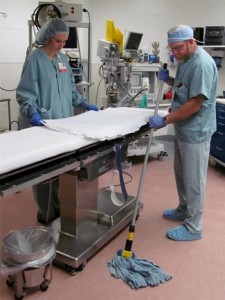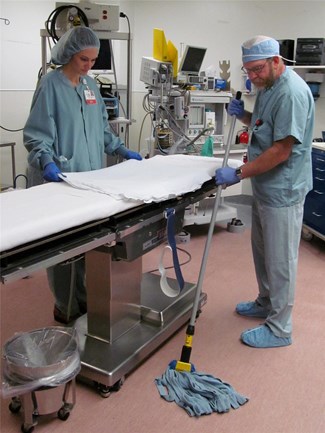
CLEARFIELD – Penn Highlands Clearfield is once again being recognized for providing safe, high quality patient care resulting from ongoing efforts to prevent hospital-acquired conditions, according to a recently released report.
The hospital’s hospital-acquired condition rate was one of five areas detailed in Highmark’s Hospital Quality Profile. Penn Highlands Clearfield’s performance was also evaluated for quality of care, serious reportable events, 30-day readmissions and patient safety indicators during calendar year 2013, the most recent period of study.
Catherine Civiello, Ph.D., director of performance improvement for Penn Highlands Clearfield, said that of the more than 360 Highmark-subscriber patient cases reviewed, there were no incidents of hospital-acquired conditions, a decrease from the previous year during which Penn Highlands Clearfield had two reported cases.
A hospital-acquired condition is an undesirable condition that affects a patient and that arose during a stay in a hospital or medical facility. Not only hospital-acquired infections but other conditions, such as pressure ulcers, skin breakdown, blood type mismatch or an injury can be considered a hospital-acquired condition.
The independent review panel was made up of clinicians in Highmark’s Quality Management Department. Their evaluations followed evidence-based practices and guidelines of the state Department of Health, federal Centers for Medicare and Medicaid and the Agency for Healthcare Research and Quality Measures to ensure hospitals in Highmark’s network are providing quality care.
Penn Highlands Clearfield scored 92.5 out of a total score of 100, ranking the hospital fourth out of 93 hospitals in the Highmark network. The hospital received the maximum number of points in four out of the five categories. It lost several points in the readmissions category, but had implemented measures to better identify those patients at-risk of requiring readmission to the hospital, and expanded efforts to ensure that patients receive the care needed after discharge.
“Improving patient outcomes is the top priority of Penn Highlands Healthcare. We are extremely pleased with how Penn Highlands Clearfield fared in this report and applaud the efforts of its physicians, nurses and staff. The clinical team at Penn Highlands Clearfield, as well as our other hospitals, will continue to strive for excellence because our patients deserve no less,” said Gary DuGan, M.D., chief medical officer for Penn Highlands Healthcare.
Civiello shared other highlights of the report. She said the quality of care category reviewed cases to determine if appropriate medical care was administered to patients. The Highmark Quality Management team found that Penn Highlands Clearfield followed the appropriate standard of care and no cases required corrective action.
Likewise, the hospital was found to have no serious reportable events. Examples of serious reportable events include surgery on the wrong body part and surgery on the wrong patient.
Further, Highmark found that Penn Highlands Clearfield had no adverse events or inpatient quality concerns. These types of events include postoperative respiratory failure, postoperative blood clots and pneumonia morality.
Civiello said the positive scores in the Highmark report are reflective of the hard work of all the hospital’s departments in advancing several initiatives, including participation in Highmark’s QualityBLUE Hospital Pay for Performance Program, which focuses on improving patient care and safety across Highmark’s hospital networks.
Additional projects under way include implementing processes that reduce the likelihood of patients experiencing adverse drug events, pressure ulcers and ventilator-associated pneumonia.
“Penn Highlands Clearfield’s outcomes are excellent and a cause to celebrate. I commend the doctors, nurses, hospital staff, housekeeping staff and members of the performance improvement team for ensuring our patients receive exceptional care,” stated Robert E. Steward Jr., M.D., a member of the hospital board of directors’ Performance Improvement Committee.
In addition to the Highmark report, Penn Highlands Clearfield’s performance was recognized in the Pennsylvania Health Care Cost Containment Council’s (PHC4) recently released Hospital Performance Report. PHC4 is an independent state agency charged with collecting, analyzing and reporting information that can be used to improve the quality of health care.
Its Hospital Performance Report includes statewide, regional and individual facility information about health care outcomes for adult patients in 17 medical categories including chest pain, heart attack medical management, diabetes, gallbladder removal, colorectal procedures, pneumonia, stroke and chronic obstructive pulmonary disease (COPD).
Penn Highlands Clearfield met expectations in the care of patients with these medical conditions. In the case of COPD, the rating for Penn Highlands Clearfield was better than expected, meaning patient outcomes were excellent.
“We are proud that duration of hospitalization for COPD is less than expected, indicating prompt and efficient care of this common diagnosis,” Civiello stated.
She added that Penn Highlands Clearfield is in the top 10th percentile for patient safety as rated by the Centers for Medicare and Medicaid.
DuGan noted that other hospitals in the Penn Highlands system – Penn Highlands Brookville, Penn Highlands DuBois and Penn Highlands Elk – also performed well in the Highmark report.
“The willingness of our team to implement improvements that positively impact the quality of care and prevent hospital-acquired conditions is a testament to the hospital’s strong commitment to patients,” stated Gary Macioce, president of Penn Highlands Clearfield.



